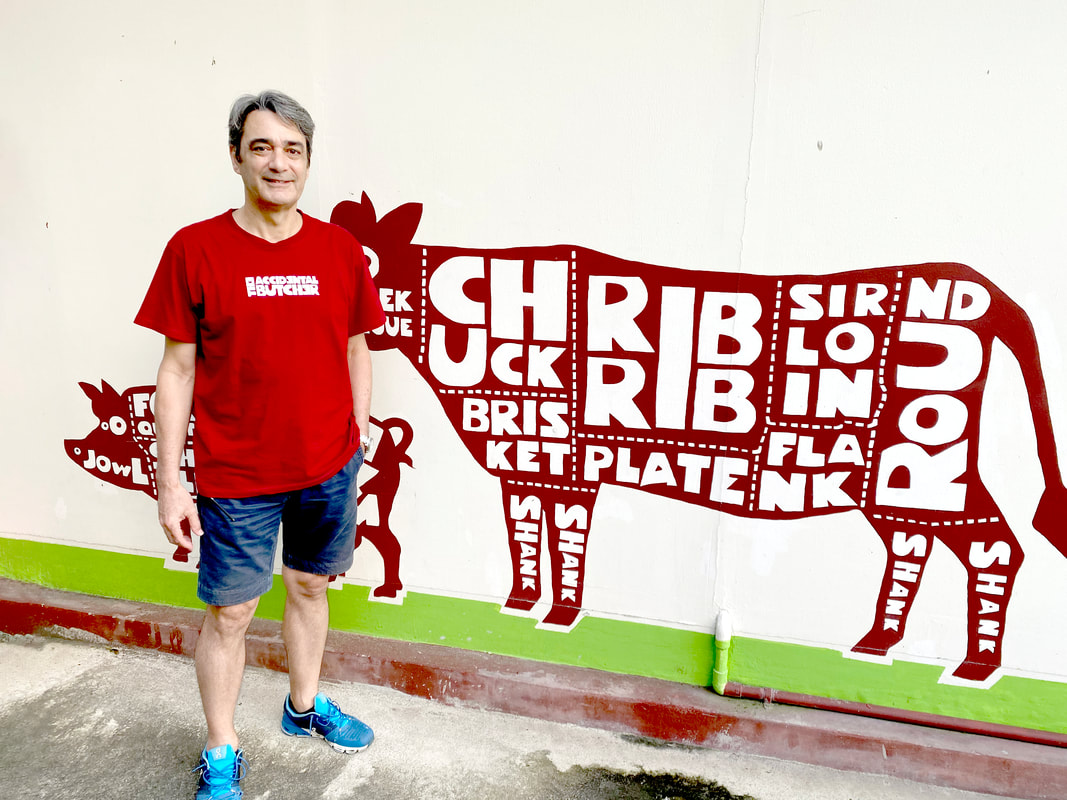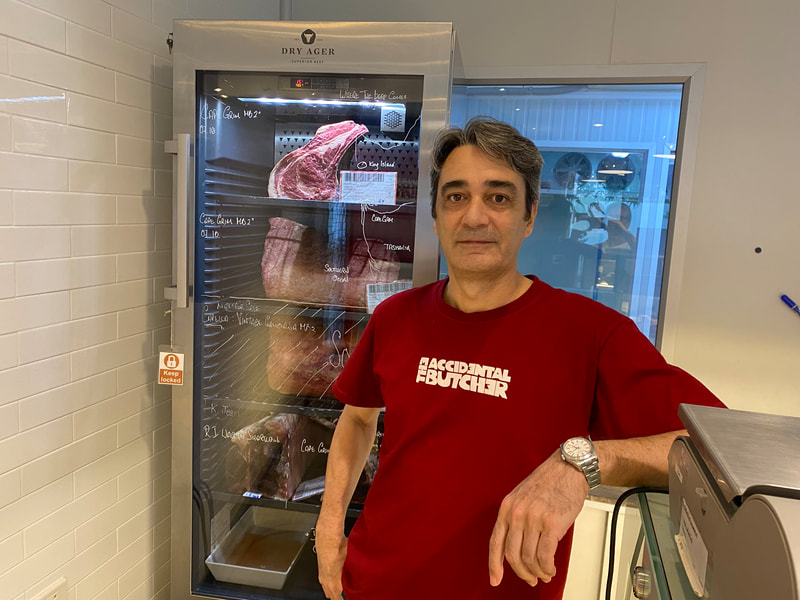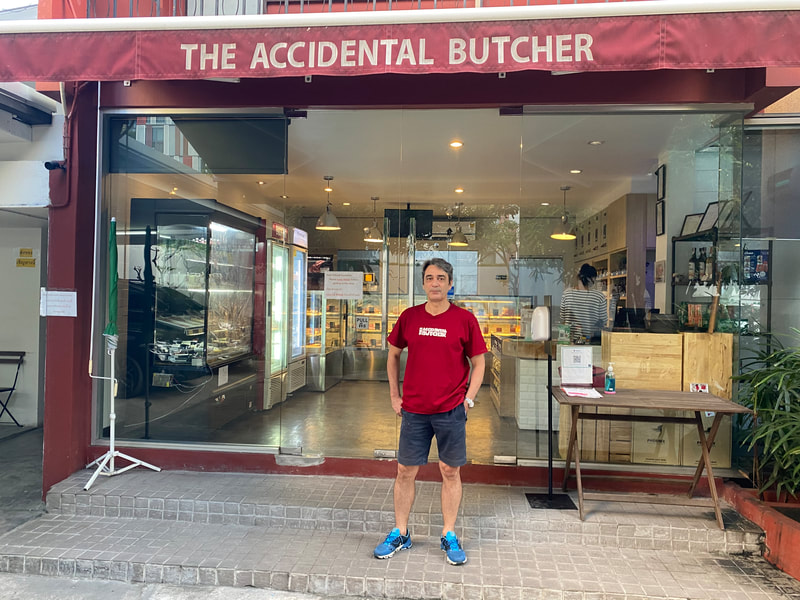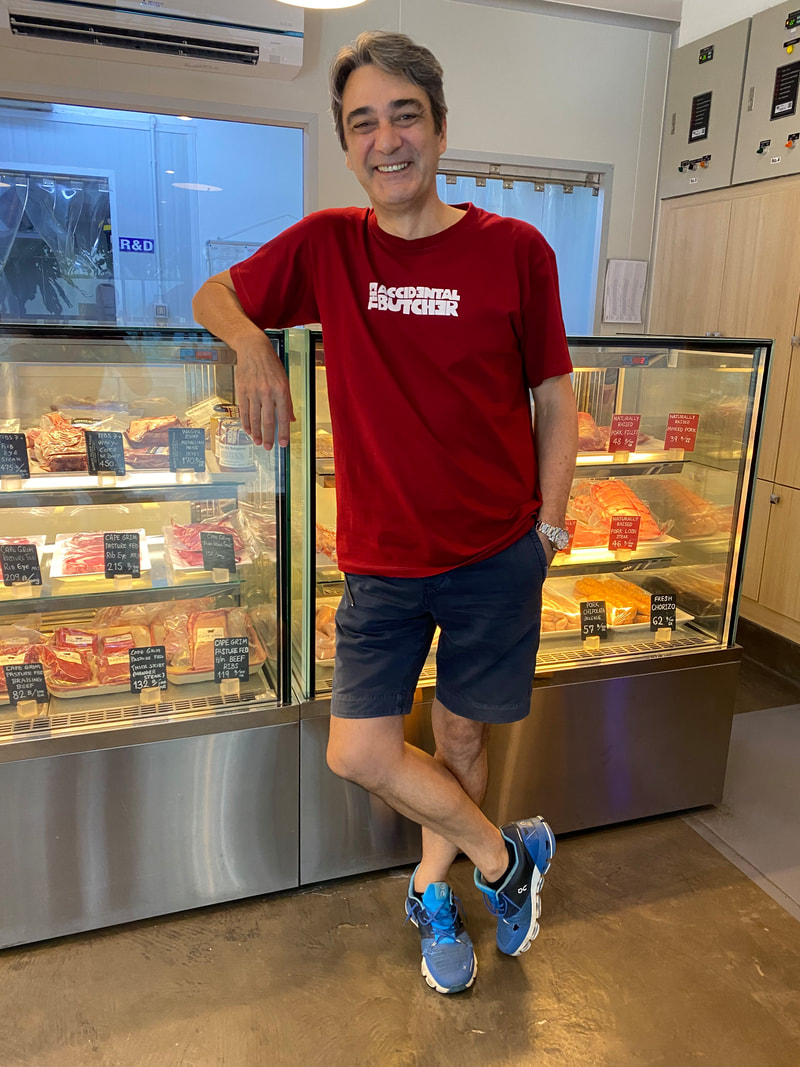By Colin Hastings
Australian veteran of Thailand’s meat business talks about his career, a recently found New Zealand family and why a series of natural disasters back home is threatening meat supplies
The last two years have been exceptionally busy for Steve Craig, owner of the Accidental Butcher, an independent retail and wholesale meat supplier located in a small side street on Bangkok’s Soi Ekamai.
“We grew by 25% in 2020 and maybe even more this year,” says Steve, explaining that his company’s trend-bucking performance in these Covid times has been due mostly to the fact that people have been eating at home more regularly because of the lockdown.
But while his shop’s products have been flying off the shelves in recent times, much to the delight of this veteran butcher, Steve faces a new challenge now affecting his business industry – how to overcome dwindling supplies from Australia, his major source of high quality beef, without unduly compromising the price he charges his growing list of customers.
The shortage is down to a combination of factors, says Steve, including a slew of natural disasters in Australia - drought, fires and a run of cold winters that have resulted in significant losses of meat and dairy cattle, all contributing to an industry downturn and the current worldwide shortage of protein.
“We grew by 25% in 2020 and maybe even more this year,” says Steve, explaining that his company’s trend-bucking performance in these Covid times has been due mostly to the fact that people have been eating at home more regularly because of the lockdown.
But while his shop’s products have been flying off the shelves in recent times, much to the delight of this veteran butcher, Steve faces a new challenge now affecting his business industry – how to overcome dwindling supplies from Australia, his major source of high quality beef, without unduly compromising the price he charges his growing list of customers.
The shortage is down to a combination of factors, says Steve, including a slew of natural disasters in Australia - drought, fires and a run of cold winters that have resulted in significant losses of meat and dairy cattle, all contributing to an industry downturn and the current worldwide shortage of protein.
| “I’m usually at the shop from morning to 7pm, and here at weekends,” he says with a smile, clearly still enjoying his work. | The situation in his homeland of Australia has also been exacerbated by politically-contrived Covid controls. “If a single case of Covid was found in a meat plant, the entire place would have to shut down for two weeks,” he says. Clouding the picture further is the escalation in the cost of air and sea freight during the pandemic. “We’re now paying four times more for air freight than in pre-Covid days, which means that the cost per kilo of products has increased from one dollar to between four and six dollars. “It’s the same with sea freight, with the cost of a 20-foot frozen container increasing by almost ten times. “Shippers and freight forwarders are making huge profits – and I don’t see their rates ever going back to the pre-Covid days.” Thanks to his long-established industry links, Steve still manages to stock his shop with regular supplies from Australia and New Zealand. As demand for his products has grown, so he has increased shipments from two tons a month to 2.6 tons. For a small family business with only eleven employees, the Accidental Butcher offers an amazingly comprehensive product range of meat cuts, from highly sought-after Dry Aged Wagyu cote de boeuf, with 7+ marbling, at 5,900 baht per kilo and Robbins Island Wagyu rib eye at 4,950 baht per kilo to more modestly priced Striploin (1,690 b/kg) and Rump Steak (1,500 baht kg) from Cape Grim in Tasmania. Veal is available as Osso Bucco, Schnitzel, Bratwurst sausage and much more. Lamb from both Australia and New Zealand comes in a wide variety of products, while the chicken and pork are sourced here in Thailand. Aware of the changing tastes the tastes and demands of his increasingly meat-savvy clientele, Steve only sells beef that’s grass-fed, naturally raised and chilled His free-range lamb comes from fully regenerative farms that do not use pesticides, herbicides or artificial fertilizers. |
To assist the growing number of home chefs, he also stocks basic cooking items like duck fat, pork lard, beef tallow and beef boulonguise sauce, along with smoked duck leg, duck confit, chicken liver pate and Iberico chorizo salami from Spain.
Every product is prepared, cut, sealed and packaged in special kitchens behind the shop where certain items are smoked. Walk-in customers are greeted with a shop-full selection of meats and poultry laid out in brightly-lit refrigerated display cabinets.
Every product is prepared, cut, sealed and packaged in special kitchens behind the shop where certain items are smoked. Walk-in customers are greeted with a shop-full selection of meats and poultry laid out in brightly-lit refrigerated display cabinets.
"Drought, fires and a run of cold winters that have caused significant losses of meat and dairy cattle in Australia, all contributing to an industry downturn and the current worldwide shortage of protein"
Until Covid, sales of the Accidental Butcher’s products were split more or less evenly between its retail and wholesale operations. Today, it’s 80% retail and 20% wholesale, the latter reflecting the impact of the pandemic on restaurants, hotels and small resorts. Its customers are increasingly Thai, accounting for up to 65% of all sales as against 35% foreigners.
PART from a three-year period when he worked in the building industry “earning good money’ back in his adopted hometown of Sydney, 55-year-old Steve has spent the best part of the last four decades as a butcher.
After dropping out of college, he initially wanted to become either an engineer or architect. Unable to land an apprenticeship or job, he changed tack and decided to try his chances as a butcher, eventually perfecting his skills in Canberra’s famous David Jones department stores. It was in effect an accidental career change, hence the name of his business today.
In 1992, he was about to relocate to Germany to learn the “sausage business” but was sidetracked by a job offer from a joint venture meat company in Singapore. Although that project only lasted six months, Steve ended up staying on the island for the next 17 years, helping to launch the first Carrefour hypermarket in 1997 and then working for another joint venture focused entirely on Australian products.
In 2008, Steve was recruited by Siam Foods in Thailand as its meat buyer. Three years later, he transferred to Makro, then owned by Dutch company SHV prior to its sale to its present owners, the CP Group.
Bored by corporate life, Steve spotted the potential for an independent meat retailer in Bangkok and in the second half of 2012 opened his own venture, The Accidental Butcher.
Three years later, Makro came knocking on his door and asked Steve to rejoin the company to work on production projects. Resigning as a director of the Accidental Butcher and leaving it in the hands of his wife Apple, Steve took up the offer and remained with Makro until earlier this year. Not unexpectedly, he continued to oversee the Accidental Butcher in his free time. “For five years, I worked every evening and every weekend,” says Steve.
He put his career on hold in 1989 in order to travel to New Zealand and explore the Maori blood line he inherited from his late mother. “Being a Maori in Australia, the pull of New Zealand is very strong. It’s just with you, even though you might have been born in Australia.”
What transpired during that trip was life-changing. “I discovered that I had four siblings living in New Zealand whom I knew nothing about. I certainly got the answers I wanted,” he recalls with a broad grin. “I was in a place of disbelief.”
Steve went on to meet all four of his half-siblings, like him of mixed race, and remains in regular with them to this day. Several have visited Thailand to meet Steve’s family - Thai wife Apple and their kids Nathan, 13, and Petra, 11.
With Apple’s Thai family of at least 80 people from four generations, plus Steve’s own family in Australia as well as his new-found relatives in New Zealand, a gathering of all the clans is likely to be a huge affair.
Although he claims to have retired after leaving Makro earlier this year, that’s not entirely accurate.
PART from a three-year period when he worked in the building industry “earning good money’ back in his adopted hometown of Sydney, 55-year-old Steve has spent the best part of the last four decades as a butcher.
After dropping out of college, he initially wanted to become either an engineer or architect. Unable to land an apprenticeship or job, he changed tack and decided to try his chances as a butcher, eventually perfecting his skills in Canberra’s famous David Jones department stores. It was in effect an accidental career change, hence the name of his business today.
In 1992, he was about to relocate to Germany to learn the “sausage business” but was sidetracked by a job offer from a joint venture meat company in Singapore. Although that project only lasted six months, Steve ended up staying on the island for the next 17 years, helping to launch the first Carrefour hypermarket in 1997 and then working for another joint venture focused entirely on Australian products.
In 2008, Steve was recruited by Siam Foods in Thailand as its meat buyer. Three years later, he transferred to Makro, then owned by Dutch company SHV prior to its sale to its present owners, the CP Group.
Bored by corporate life, Steve spotted the potential for an independent meat retailer in Bangkok and in the second half of 2012 opened his own venture, The Accidental Butcher.
Three years later, Makro came knocking on his door and asked Steve to rejoin the company to work on production projects. Resigning as a director of the Accidental Butcher and leaving it in the hands of his wife Apple, Steve took up the offer and remained with Makro until earlier this year. Not unexpectedly, he continued to oversee the Accidental Butcher in his free time. “For five years, I worked every evening and every weekend,” says Steve.
He put his career on hold in 1989 in order to travel to New Zealand and explore the Maori blood line he inherited from his late mother. “Being a Maori in Australia, the pull of New Zealand is very strong. It’s just with you, even though you might have been born in Australia.”
What transpired during that trip was life-changing. “I discovered that I had four siblings living in New Zealand whom I knew nothing about. I certainly got the answers I wanted,” he recalls with a broad grin. “I was in a place of disbelief.”
Steve went on to meet all four of his half-siblings, like him of mixed race, and remains in regular with them to this day. Several have visited Thailand to meet Steve’s family - Thai wife Apple and their kids Nathan, 13, and Petra, 11.
With Apple’s Thai family of at least 80 people from four generations, plus Steve’s own family in Australia as well as his new-found relatives in New Zealand, a gathering of all the clans is likely to be a huge affair.
Although he claims to have retired after leaving Makro earlier this year, that’s not entirely accurate.
"What transpired during that trip was life-changing. “I discovered that I had four siblings living in New Zealand whom I knew nothing about. I certainly got the answers I wanted,” he recalls with a broad grin. “I was in a place of disbelief."





 RSS Feed
RSS Feed
















